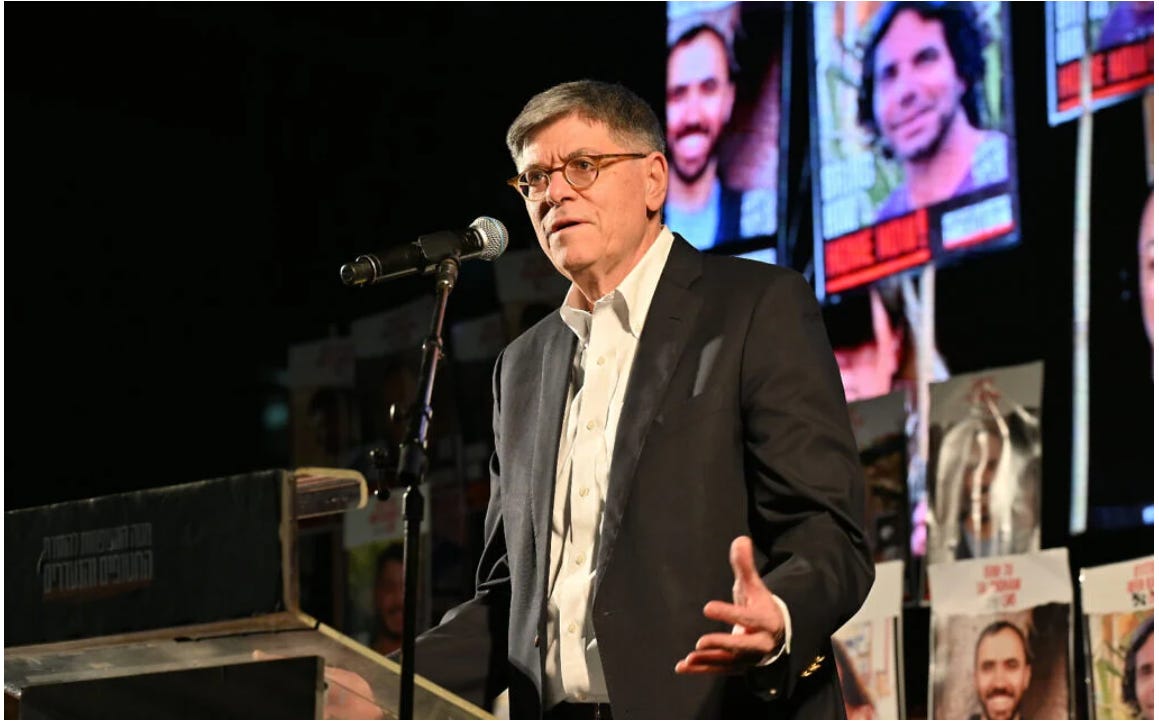Interview of Our Ambassador to Israel, Jack Lew
I never send out two posts in one day but I am making an exception because many will have greater opportunity to read the interview on a Sunday than during the work week.
Longtime journalist and founder and publisher of The Times of Israel, David Horowitz, just published a quite long and quite important interview of our country’s outgoing ambassador to Israel, Jack Lew. It’s a bit of a commitment but I highly recommend reading it as Lew provides the clearest explanation and defense of the Biden administration’s conduct and policy since October of 2023 I have seen.
Jack Lew is a 69-year-old, observant Jew with many decades of high-level experience in government and the private sector who is highly respected by a broad spectrum of observers of the US-Israel relationship. So, while his comments are unavoidably limited and shaded to some extent by his diplomatic position, his articulation of the last 15 months is both sober and credible.
I won’t get into all the areas he discusses here, you’ll have to read the interview for that, but I’ll touch upon what I consider his most salient, big-picture observations. First, as with all in life, black and white is not a thing when discussing the US-Israel relationship, let alone its contours during the diplomatic, political, and military maelstrom since October 7. It should go without saying that neither Israel nor the Biden administration are always right or always wrong. It’s complicated and there is blame and credit to go around.
Messaging may have been the biggest problem. For his part, the President and his representatives should have routinely repeated the fundamental truths identified by Biden in the first days following October 7 to ensure they defined the foundational context within which all other developments could be understood. They were these: October 7 and Hamas were “sheer evil” about which there are no two sides. And, Israel’s war against Hamas and its anti-Western, jihadist allies in the region is “part of an inflection point in history” and a matter of American security. This would have had a profound impact on shaping American and global public opinion and mitigated the negative political, diplomatic, and even military impact of administration statements and policies which, fairly or not, put Israel in a negative light.
Our administration also made unhelpful and unforced errors in public statements concerning specific developments, for example, the hostage negotiations. Lew was clear that Bibi Netanyahu has not been the obstacle to a hostage deal. Rather, the fault lies with Hamas and always has. Good to know, but that is not how the last many months of negotiations have been portrayed, something which gave a not insignificant swathe of Democratic lawmakers license to demonize Israel and, in some cases, assume the politically facile, conceptually incoherent and cynical posture of supporting Israel but not "Netanyahu’s right-wing extremist government’s war.”
As for the government of Israel, its public communications bear some responsibility for undermining world opinion about it and its prosecution of the war. Some of its failings were due to politics and some were due to poor execution. An example of the former is its restrained public description of the monumental IDF efforts to provide Gaza with humanitarian aid. As Lew points out, and as I heard in Israel last March directly from the head of COGAT, the IDF department charged with aid facilitation, Israel’s efforts on the ground far exceed what Israel communicates externally. The reason is political. Israelis, fighting an existential, 7-front war against an enemy bent on genocide that committed the most barbaric massacre of Jews since the Holocaust, are highly unsympathetic to ensuring it and its population do not want for food, water, or energy even as they hold over a hundred Israelis captive under barbaric conditions. As a strategic matter the IDF felt compelled to provide aid, as a political matter it was very hesitant to detail its efforts publicly.
Then there have been the smaller bore, arguably more cynical considerations of coalition politics. Bibi Netanyahu has at times been incentivized to publicly portray rifts with the American administration which either did not exist or were far less pronounced than advertised. In Lew’s telling, the Prime Minister’s portrayal of the American position on Rafah, and its very limited contraint of specific armaments have been prime examples.
On the execution side, Lew was critical of the IDF’s inability to get ahead of the news and communicate its version of controversial and often explosive events to the media and policymakers, before its enemies and detractors published theirs. While he concedes one reason is the honorable impulse of Israel, as a democracy, to ensure it had all the relevant facts, it is clear he believes greater prioritization of this effort would have engendered better performance.
And then there’s the international bias and excoriation over which neither Israel nor the United States has much control. Lew observes that while he feels the media here, thanks in part to our government’s orientation, offers a reasonably wholistic view of October 7 and its aftermath, internationally the last 15 months have been an onslaught of images and stories from the disaster which is Gaza, with scant reference to the cataclysmic atrocity which gave rise to it. Ambassador Lew closes by expressing concern about the war’s impact on the world’s and even America’s view of Israel, particularly those of future policymakers who lack the connection to Israel’s founding, and the war’s fought since, necessary to properly understand the last 15 months.




